Therapeutic Intervention Experience, Nursing Standards, NURS3002 Essay
VerifiedAdded on 2022/12/28
|10
|3253
|96
Essay
AI Summary
This essay examines a registered nurse's experience with therapeutic interventions within a healthcare setting, focusing on psychological, physical, and pharmacological approaches. The essay provides an objective account of the nurse's previous professional experience, highlighting the importance of patient relationships and effective communication. It then links this experience to two key Australian Nursing Standards: Standard 1 (specifically 1.4) and Standard 3 (specifically 3.4), demonstrating how the nurse's actions align with the standards related to decision-making, regulations, and accountability. The essay also discusses the impact of neglecting or not adhering to these standards, emphasizing their crucial role in safe and quality nursing practice. The nurse reflects on how therapeutic interventions, like mobility therapy for patients with dementia, can significantly improve patient outcomes and well-being. The essay concludes by reiterating the importance of nursing standards in guiding practice and ensuring positive patient care, highlighting the significance of ethics, communication, and professional development in the nursing profession.
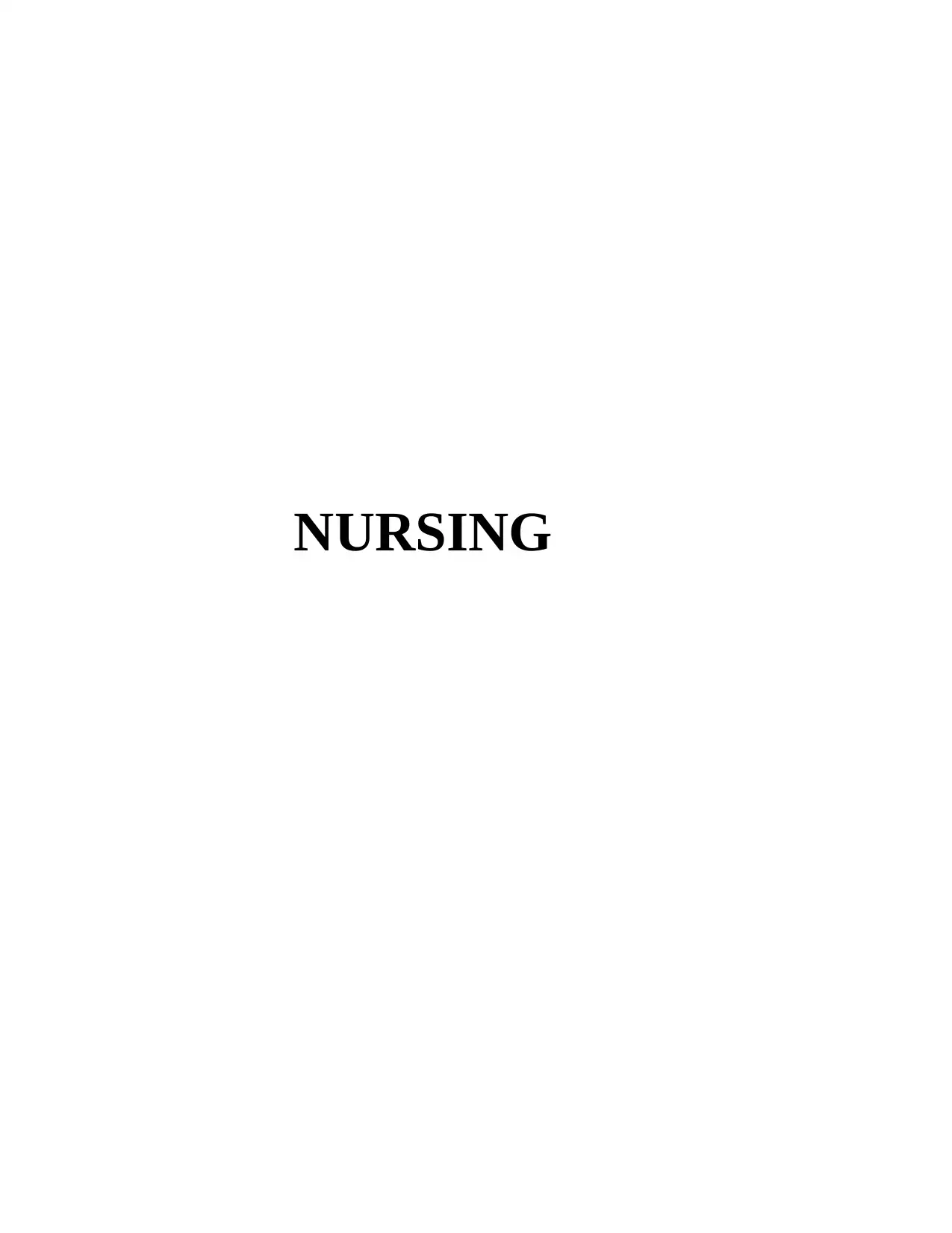
NURSING
Paraphrase This Document
Need a fresh take? Get an instant paraphrase of this document with our AI Paraphraser
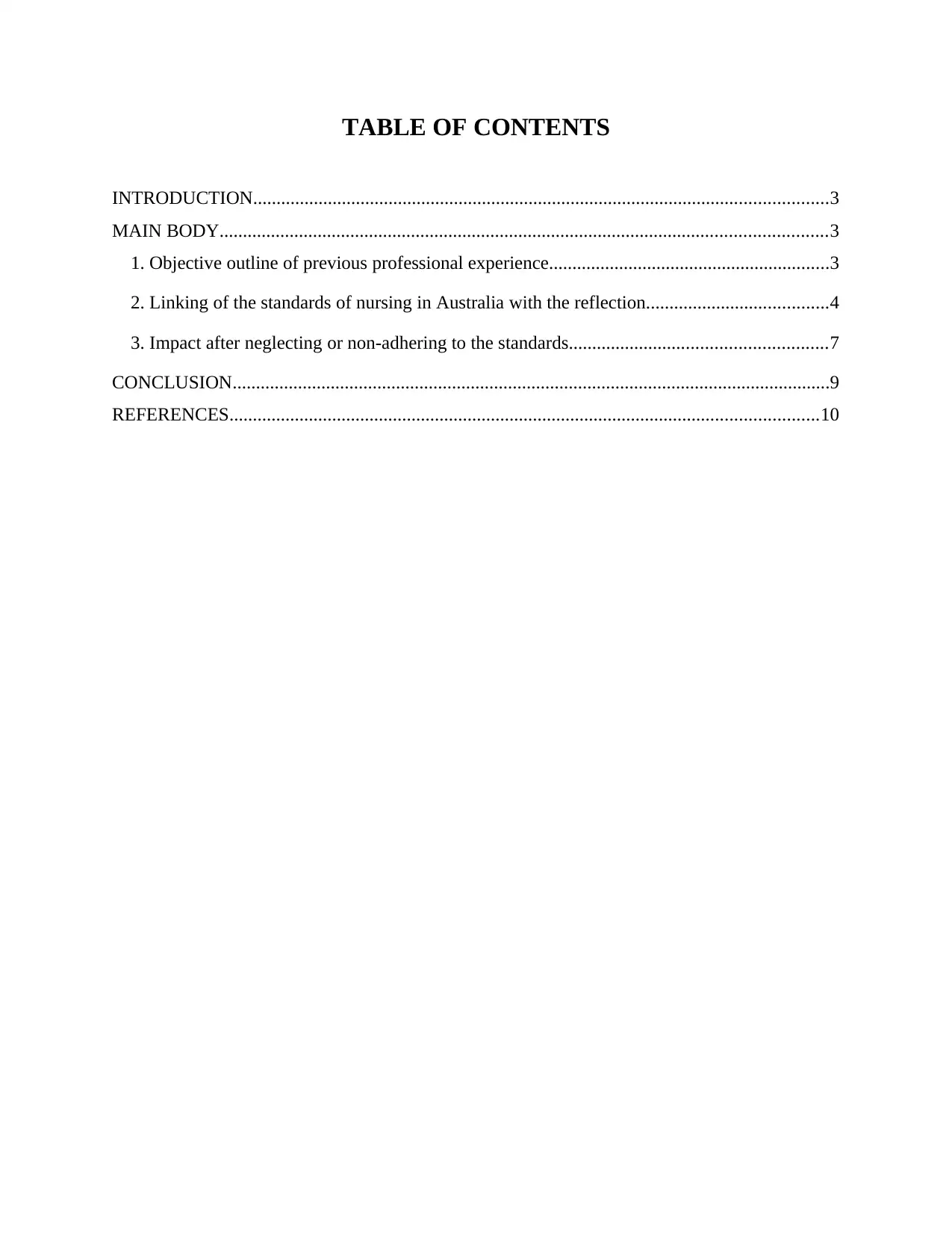
TABLE OF CONTENTS
INTRODUCTION...........................................................................................................................3
MAIN BODY..................................................................................................................................3
1. Objective outline of previous professional experience............................................................3
2. Linking of the standards of nursing in Australia with the reflection.......................................4
3. Impact after neglecting or non-adhering to the standards.......................................................7
CONCLUSION................................................................................................................................9
REFERENCES..............................................................................................................................10
INTRODUCTION...........................................................................................................................3
MAIN BODY..................................................................................................................................3
1. Objective outline of previous professional experience............................................................3
2. Linking of the standards of nursing in Australia with the reflection.......................................4
3. Impact after neglecting or non-adhering to the standards.......................................................7
CONCLUSION................................................................................................................................9
REFERENCES..............................................................................................................................10
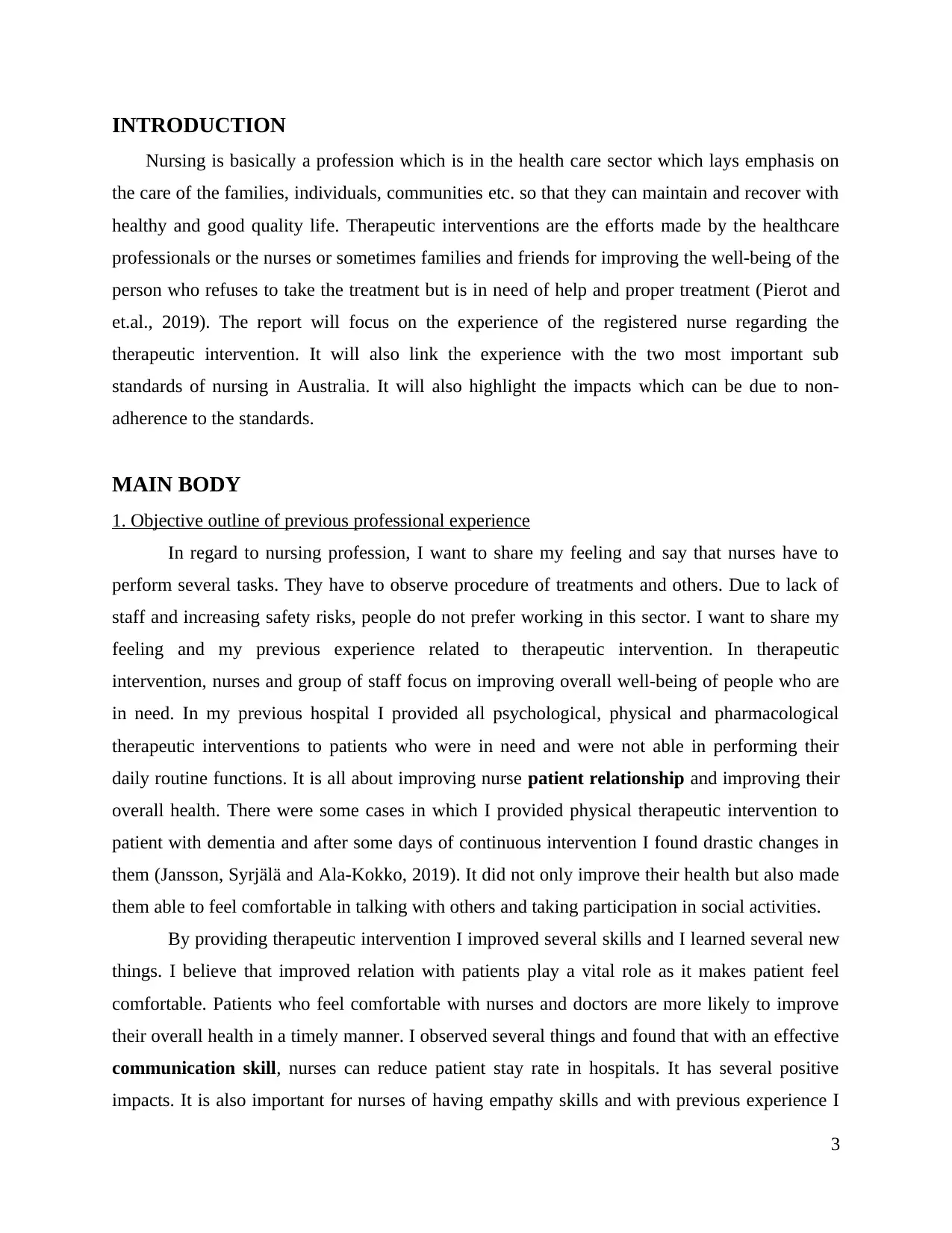
INTRODUCTION
Nursing is basically a profession which is in the health care sector which lays emphasis on
the care of the families, individuals, communities etc. so that they can maintain and recover with
healthy and good quality life. Therapeutic interventions are the efforts made by the healthcare
professionals or the nurses or sometimes families and friends for improving the well-being of the
person who refuses to take the treatment but is in need of help and proper treatment (Pierot and
et.al., 2019). The report will focus on the experience of the registered nurse regarding the
therapeutic intervention. It will also link the experience with the two most important sub
standards of nursing in Australia. It will also highlight the impacts which can be due to non-
adherence to the standards.
MAIN BODY
1. Objective outline of previous professional experience
In regard to nursing profession, I want to share my feeling and say that nurses have to
perform several tasks. They have to observe procedure of treatments and others. Due to lack of
staff and increasing safety risks, people do not prefer working in this sector. I want to share my
feeling and my previous experience related to therapeutic intervention. In therapeutic
intervention, nurses and group of staff focus on improving overall well-being of people who are
in need. In my previous hospital I provided all psychological, physical and pharmacological
therapeutic interventions to patients who were in need and were not able in performing their
daily routine functions. It is all about improving nurse patient relationship and improving their
overall health. There were some cases in which I provided physical therapeutic intervention to
patient with dementia and after some days of continuous intervention I found drastic changes in
them (Jansson, Syrjälä and Ala-Kokko, 2019). It did not only improve their health but also made
them able to feel comfortable in talking with others and taking participation in social activities.
By providing therapeutic intervention I improved several skills and I learned several new
things. I believe that improved relation with patients play a vital role as it makes patient feel
comfortable. Patients who feel comfortable with nurses and doctors are more likely to improve
their overall health in a timely manner. I observed several things and found that with an effective
communication skill, nurses can reduce patient stay rate in hospitals. It has several positive
impacts. It is also important for nurses of having empathy skills and with previous experience I
3
Nursing is basically a profession which is in the health care sector which lays emphasis on
the care of the families, individuals, communities etc. so that they can maintain and recover with
healthy and good quality life. Therapeutic interventions are the efforts made by the healthcare
professionals or the nurses or sometimes families and friends for improving the well-being of the
person who refuses to take the treatment but is in need of help and proper treatment (Pierot and
et.al., 2019). The report will focus on the experience of the registered nurse regarding the
therapeutic intervention. It will also link the experience with the two most important sub
standards of nursing in Australia. It will also highlight the impacts which can be due to non-
adherence to the standards.
MAIN BODY
1. Objective outline of previous professional experience
In regard to nursing profession, I want to share my feeling and say that nurses have to
perform several tasks. They have to observe procedure of treatments and others. Due to lack of
staff and increasing safety risks, people do not prefer working in this sector. I want to share my
feeling and my previous experience related to therapeutic intervention. In therapeutic
intervention, nurses and group of staff focus on improving overall well-being of people who are
in need. In my previous hospital I provided all psychological, physical and pharmacological
therapeutic interventions to patients who were in need and were not able in performing their
daily routine functions. It is all about improving nurse patient relationship and improving their
overall health. There were some cases in which I provided physical therapeutic intervention to
patient with dementia and after some days of continuous intervention I found drastic changes in
them (Jansson, Syrjälä and Ala-Kokko, 2019). It did not only improve their health but also made
them able to feel comfortable in talking with others and taking participation in social activities.
By providing therapeutic intervention I improved several skills and I learned several new
things. I believe that improved relation with patients play a vital role as it makes patient feel
comfortable. Patients who feel comfortable with nurses and doctors are more likely to improve
their overall health in a timely manner. I observed several things and found that with an effective
communication skill, nurses can reduce patient stay rate in hospitals. It has several positive
impacts. It is also important for nurses of having empathy skills and with previous experience I
3
⊘ This is a preview!⊘
Do you want full access?
Subscribe today to unlock all pages.

Trusted by 1+ million students worldwide
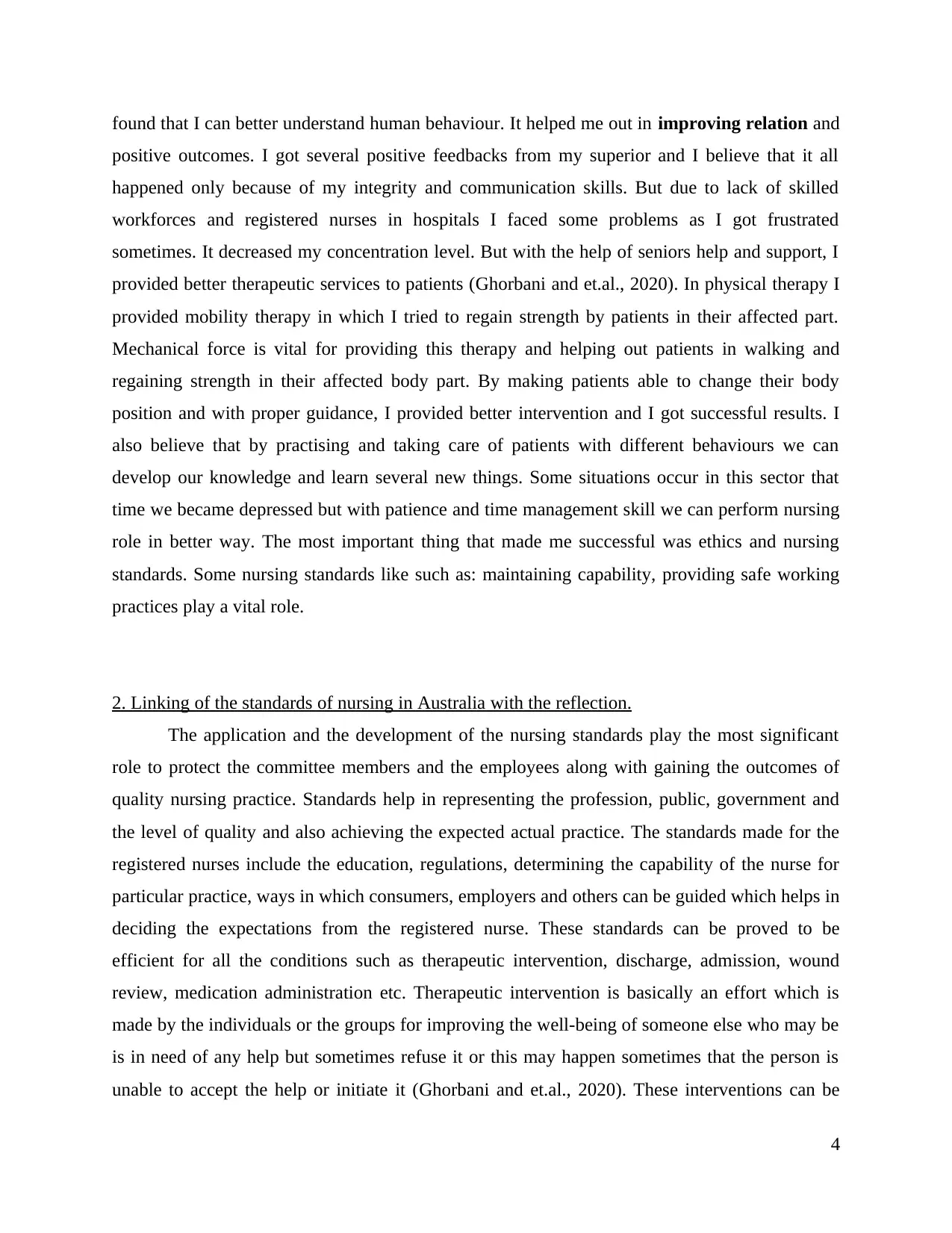
found that I can better understand human behaviour. It helped me out in improving relation and
positive outcomes. I got several positive feedbacks from my superior and I believe that it all
happened only because of my integrity and communication skills. But due to lack of skilled
workforces and registered nurses in hospitals I faced some problems as I got frustrated
sometimes. It decreased my concentration level. But with the help of seniors help and support, I
provided better therapeutic services to patients (Ghorbani and et.al., 2020). In physical therapy I
provided mobility therapy in which I tried to regain strength by patients in their affected part.
Mechanical force is vital for providing this therapy and helping out patients in walking and
regaining strength in their affected body part. By making patients able to change their body
position and with proper guidance, I provided better intervention and I got successful results. I
also believe that by practising and taking care of patients with different behaviours we can
develop our knowledge and learn several new things. Some situations occur in this sector that
time we became depressed but with patience and time management skill we can perform nursing
role in better way. The most important thing that made me successful was ethics and nursing
standards. Some nursing standards like such as: maintaining capability, providing safe working
practices play a vital role.
2. Linking of the standards of nursing in Australia with the reflection.
The application and the development of the nursing standards play the most significant
role to protect the committee members and the employees along with gaining the outcomes of
quality nursing practice. Standards help in representing the profession, public, government and
the level of quality and also achieving the expected actual practice. The standards made for the
registered nurses include the education, regulations, determining the capability of the nurse for
particular practice, ways in which consumers, employers and others can be guided which helps in
deciding the expectations from the registered nurse. These standards can be proved to be
efficient for all the conditions such as therapeutic intervention, discharge, admission, wound
review, medication administration etc. Therapeutic intervention is basically an effort which is
made by the individuals or the groups for improving the well-being of someone else who may be
is in need of any help but sometimes refuse it or this may happen sometimes that the person is
unable to accept the help or initiate it (Ghorbani and et.al., 2020). These interventions can be
4
positive outcomes. I got several positive feedbacks from my superior and I believe that it all
happened only because of my integrity and communication skills. But due to lack of skilled
workforces and registered nurses in hospitals I faced some problems as I got frustrated
sometimes. It decreased my concentration level. But with the help of seniors help and support, I
provided better therapeutic services to patients (Ghorbani and et.al., 2020). In physical therapy I
provided mobility therapy in which I tried to regain strength by patients in their affected part.
Mechanical force is vital for providing this therapy and helping out patients in walking and
regaining strength in their affected body part. By making patients able to change their body
position and with proper guidance, I provided better intervention and I got successful results. I
also believe that by practising and taking care of patients with different behaviours we can
develop our knowledge and learn several new things. Some situations occur in this sector that
time we became depressed but with patience and time management skill we can perform nursing
role in better way. The most important thing that made me successful was ethics and nursing
standards. Some nursing standards like such as: maintaining capability, providing safe working
practices play a vital role.
2. Linking of the standards of nursing in Australia with the reflection.
The application and the development of the nursing standards play the most significant
role to protect the committee members and the employees along with gaining the outcomes of
quality nursing practice. Standards help in representing the profession, public, government and
the level of quality and also achieving the expected actual practice. The standards made for the
registered nurses include the education, regulations, determining the capability of the nurse for
particular practice, ways in which consumers, employers and others can be guided which helps in
deciding the expectations from the registered nurse. These standards can be proved to be
efficient for all the conditions such as therapeutic intervention, discharge, admission, wound
review, medication administration etc. Therapeutic intervention is basically an effort which is
made by the individuals or the groups for improving the well-being of someone else who may be
is in need of any help but sometimes refuse it or this may happen sometimes that the person is
unable to accept the help or initiate it (Ghorbani and et.al., 2020). These interventions can be
4
Paraphrase This Document
Need a fresh take? Get an instant paraphrase of this document with our AI Paraphraser
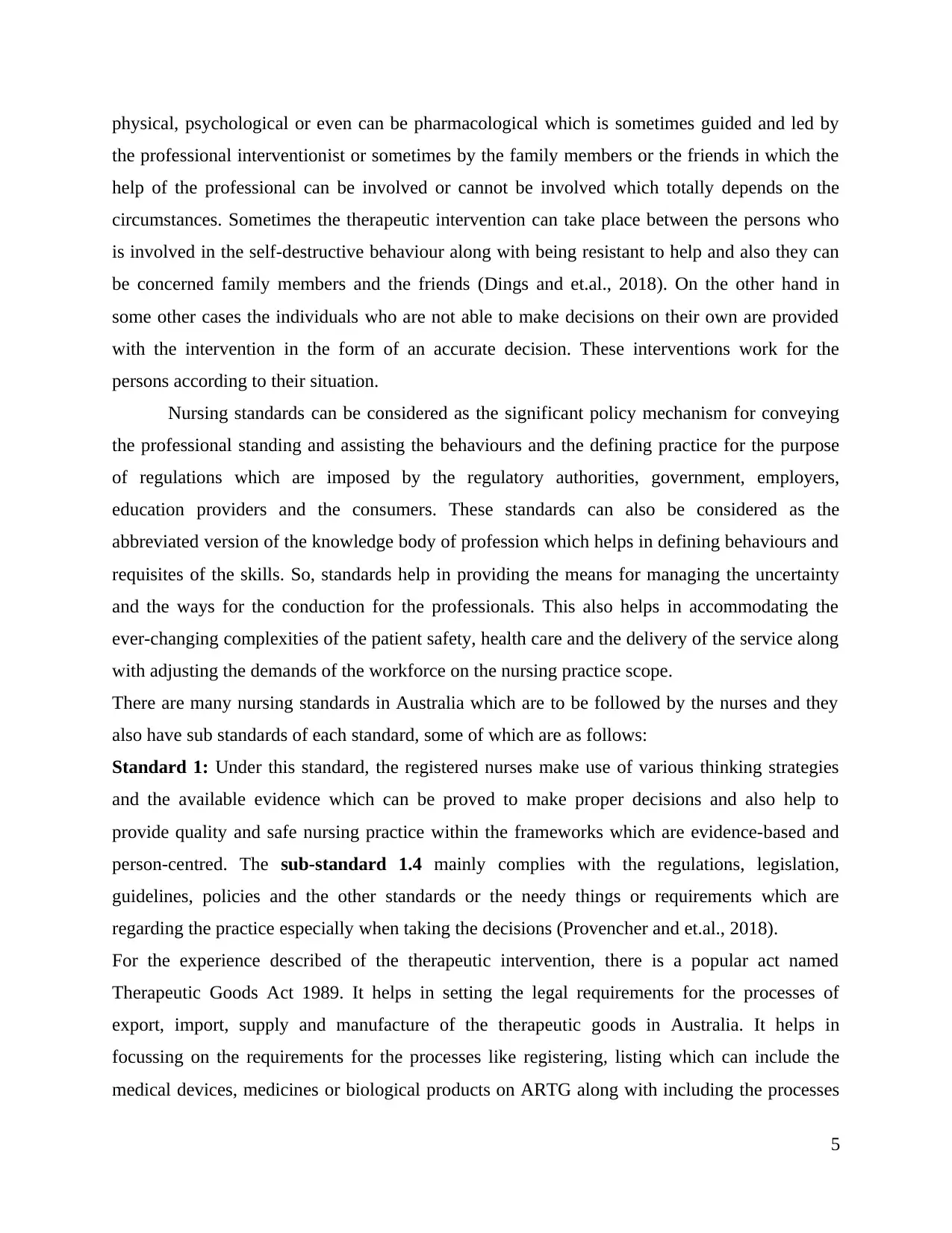
physical, psychological or even can be pharmacological which is sometimes guided and led by
the professional interventionist or sometimes by the family members or the friends in which the
help of the professional can be involved or cannot be involved which totally depends on the
circumstances. Sometimes the therapeutic intervention can take place between the persons who
is involved in the self-destructive behaviour along with being resistant to help and also they can
be concerned family members and the friends (Dings and et.al., 2018). On the other hand in
some other cases the individuals who are not able to make decisions on their own are provided
with the intervention in the form of an accurate decision. These interventions work for the
persons according to their situation.
Nursing standards can be considered as the significant policy mechanism for conveying
the professional standing and assisting the behaviours and the defining practice for the purpose
of regulations which are imposed by the regulatory authorities, government, employers,
education providers and the consumers. These standards can also be considered as the
abbreviated version of the knowledge body of profession which helps in defining behaviours and
requisites of the skills. So, standards help in providing the means for managing the uncertainty
and the ways for the conduction for the professionals. This also helps in accommodating the
ever-changing complexities of the patient safety, health care and the delivery of the service along
with adjusting the demands of the workforce on the nursing practice scope.
There are many nursing standards in Australia which are to be followed by the nurses and they
also have sub standards of each standard, some of which are as follows:
Standard 1: Under this standard, the registered nurses make use of various thinking strategies
and the available evidence which can be proved to make proper decisions and also help to
provide quality and safe nursing practice within the frameworks which are evidence-based and
person-centred. The sub-standard 1.4 mainly complies with the regulations, legislation,
guidelines, policies and the other standards or the needy things or requirements which are
regarding the practice especially when taking the decisions (Provencher and et.al., 2018).
For the experience described of the therapeutic intervention, there is a popular act named
Therapeutic Goods Act 1989. It helps in setting the legal requirements for the processes of
export, import, supply and manufacture of the therapeutic goods in Australia. It helps in
focussing on the requirements for the processes like registering, listing which can include the
medical devices, medicines or biological products on ARTG along with including the processes
5
the professional interventionist or sometimes by the family members or the friends in which the
help of the professional can be involved or cannot be involved which totally depends on the
circumstances. Sometimes the therapeutic intervention can take place between the persons who
is involved in the self-destructive behaviour along with being resistant to help and also they can
be concerned family members and the friends (Dings and et.al., 2018). On the other hand in
some other cases the individuals who are not able to make decisions on their own are provided
with the intervention in the form of an accurate decision. These interventions work for the
persons according to their situation.
Nursing standards can be considered as the significant policy mechanism for conveying
the professional standing and assisting the behaviours and the defining practice for the purpose
of regulations which are imposed by the regulatory authorities, government, employers,
education providers and the consumers. These standards can also be considered as the
abbreviated version of the knowledge body of profession which helps in defining behaviours and
requisites of the skills. So, standards help in providing the means for managing the uncertainty
and the ways for the conduction for the professionals. This also helps in accommodating the
ever-changing complexities of the patient safety, health care and the delivery of the service along
with adjusting the demands of the workforce on the nursing practice scope.
There are many nursing standards in Australia which are to be followed by the nurses and they
also have sub standards of each standard, some of which are as follows:
Standard 1: Under this standard, the registered nurses make use of various thinking strategies
and the available evidence which can be proved to make proper decisions and also help to
provide quality and safe nursing practice within the frameworks which are evidence-based and
person-centred. The sub-standard 1.4 mainly complies with the regulations, legislation,
guidelines, policies and the other standards or the needy things or requirements which are
regarding the practice especially when taking the decisions (Provencher and et.al., 2018).
For the experience described of the therapeutic intervention, there is a popular act named
Therapeutic Goods Act 1989. It helps in setting the legal requirements for the processes of
export, import, supply and manufacture of the therapeutic goods in Australia. It helps in
focussing on the requirements for the processes like registering, listing which can include the
medical devices, medicines or biological products on ARTG along with including the processes
5
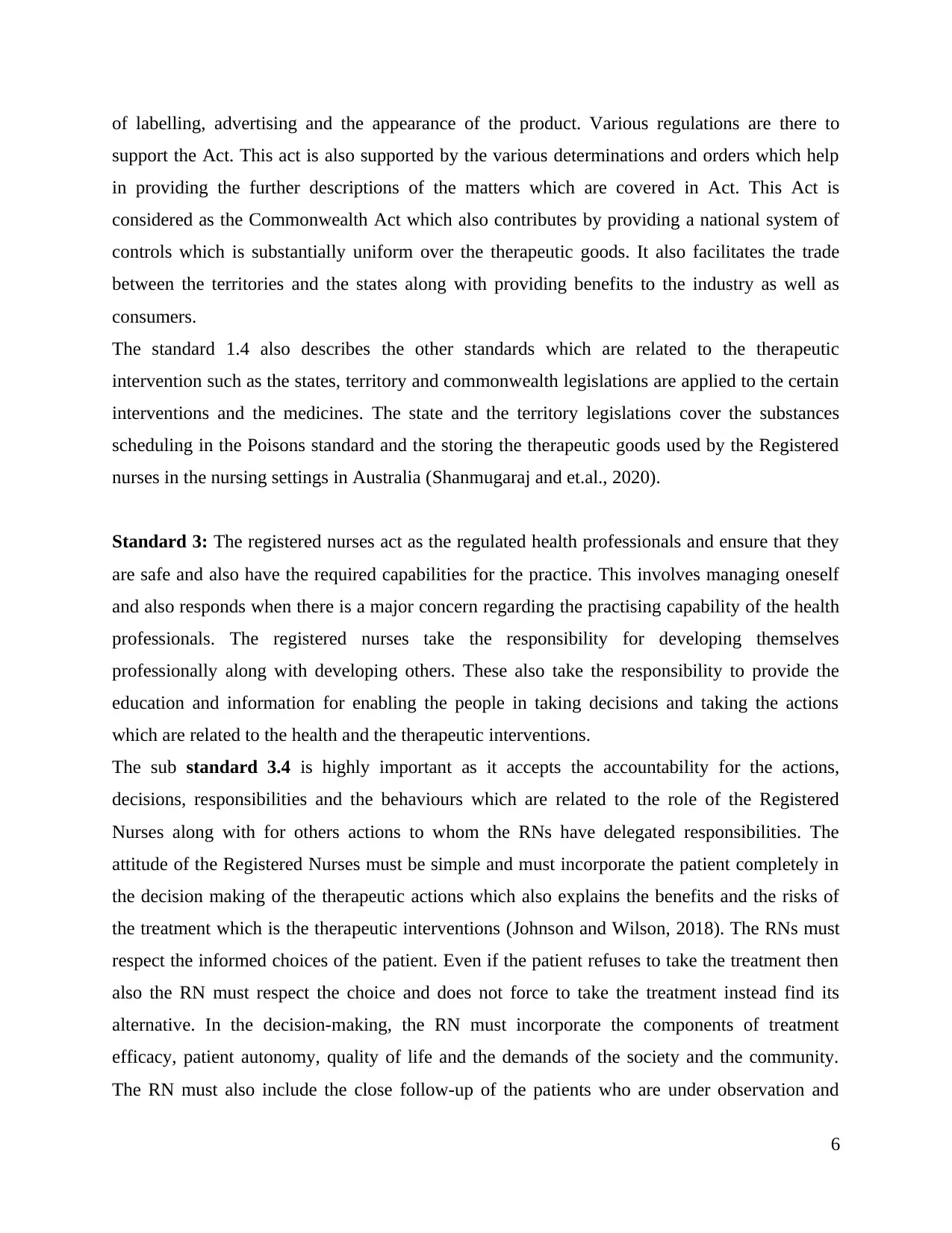
of labelling, advertising and the appearance of the product. Various regulations are there to
support the Act. This act is also supported by the various determinations and orders which help
in providing the further descriptions of the matters which are covered in Act. This Act is
considered as the Commonwealth Act which also contributes by providing a national system of
controls which is substantially uniform over the therapeutic goods. It also facilitates the trade
between the territories and the states along with providing benefits to the industry as well as
consumers.
The standard 1.4 also describes the other standards which are related to the therapeutic
intervention such as the states, territory and commonwealth legislations are applied to the certain
interventions and the medicines. The state and the territory legislations cover the substances
scheduling in the Poisons standard and the storing the therapeutic goods used by the Registered
nurses in the nursing settings in Australia (Shanmugaraj and et.al., 2020).
Standard 3: The registered nurses act as the regulated health professionals and ensure that they
are safe and also have the required capabilities for the practice. This involves managing oneself
and also responds when there is a major concern regarding the practising capability of the health
professionals. The registered nurses take the responsibility for developing themselves
professionally along with developing others. These also take the responsibility to provide the
education and information for enabling the people in taking decisions and taking the actions
which are related to the health and the therapeutic interventions.
The sub standard 3.4 is highly important as it accepts the accountability for the actions,
decisions, responsibilities and the behaviours which are related to the role of the Registered
Nurses along with for others actions to whom the RNs have delegated responsibilities. The
attitude of the Registered Nurses must be simple and must incorporate the patient completely in
the decision making of the therapeutic actions which also explains the benefits and the risks of
the treatment which is the therapeutic interventions (Johnson and Wilson, 2018). The RNs must
respect the informed choices of the patient. Even if the patient refuses to take the treatment then
also the RN must respect the choice and does not force to take the treatment instead find its
alternative. In the decision-making, the RN must incorporate the components of treatment
efficacy, patient autonomy, quality of life and the demands of the society and the community.
The RN must also include the close follow-up of the patients who are under observation and
6
support the Act. This act is also supported by the various determinations and orders which help
in providing the further descriptions of the matters which are covered in Act. This Act is
considered as the Commonwealth Act which also contributes by providing a national system of
controls which is substantially uniform over the therapeutic goods. It also facilitates the trade
between the territories and the states along with providing benefits to the industry as well as
consumers.
The standard 1.4 also describes the other standards which are related to the therapeutic
intervention such as the states, territory and commonwealth legislations are applied to the certain
interventions and the medicines. The state and the territory legislations cover the substances
scheduling in the Poisons standard and the storing the therapeutic goods used by the Registered
nurses in the nursing settings in Australia (Shanmugaraj and et.al., 2020).
Standard 3: The registered nurses act as the regulated health professionals and ensure that they
are safe and also have the required capabilities for the practice. This involves managing oneself
and also responds when there is a major concern regarding the practising capability of the health
professionals. The registered nurses take the responsibility for developing themselves
professionally along with developing others. These also take the responsibility to provide the
education and information for enabling the people in taking decisions and taking the actions
which are related to the health and the therapeutic interventions.
The sub standard 3.4 is highly important as it accepts the accountability for the actions,
decisions, responsibilities and the behaviours which are related to the role of the Registered
Nurses along with for others actions to whom the RNs have delegated responsibilities. The
attitude of the Registered Nurses must be simple and must incorporate the patient completely in
the decision making of the therapeutic actions which also explains the benefits and the risks of
the treatment which is the therapeutic interventions (Johnson and Wilson, 2018). The RNs must
respect the informed choices of the patient. Even if the patient refuses to take the treatment then
also the RN must respect the choice and does not force to take the treatment instead find its
alternative. In the decision-making, the RN must incorporate the components of treatment
efficacy, patient autonomy, quality of life and the demands of the society and the community.
The RN must also include the close follow-up of the patients who are under observation and
6
⊘ This is a preview!⊘
Do you want full access?
Subscribe today to unlock all pages.

Trusted by 1+ million students worldwide
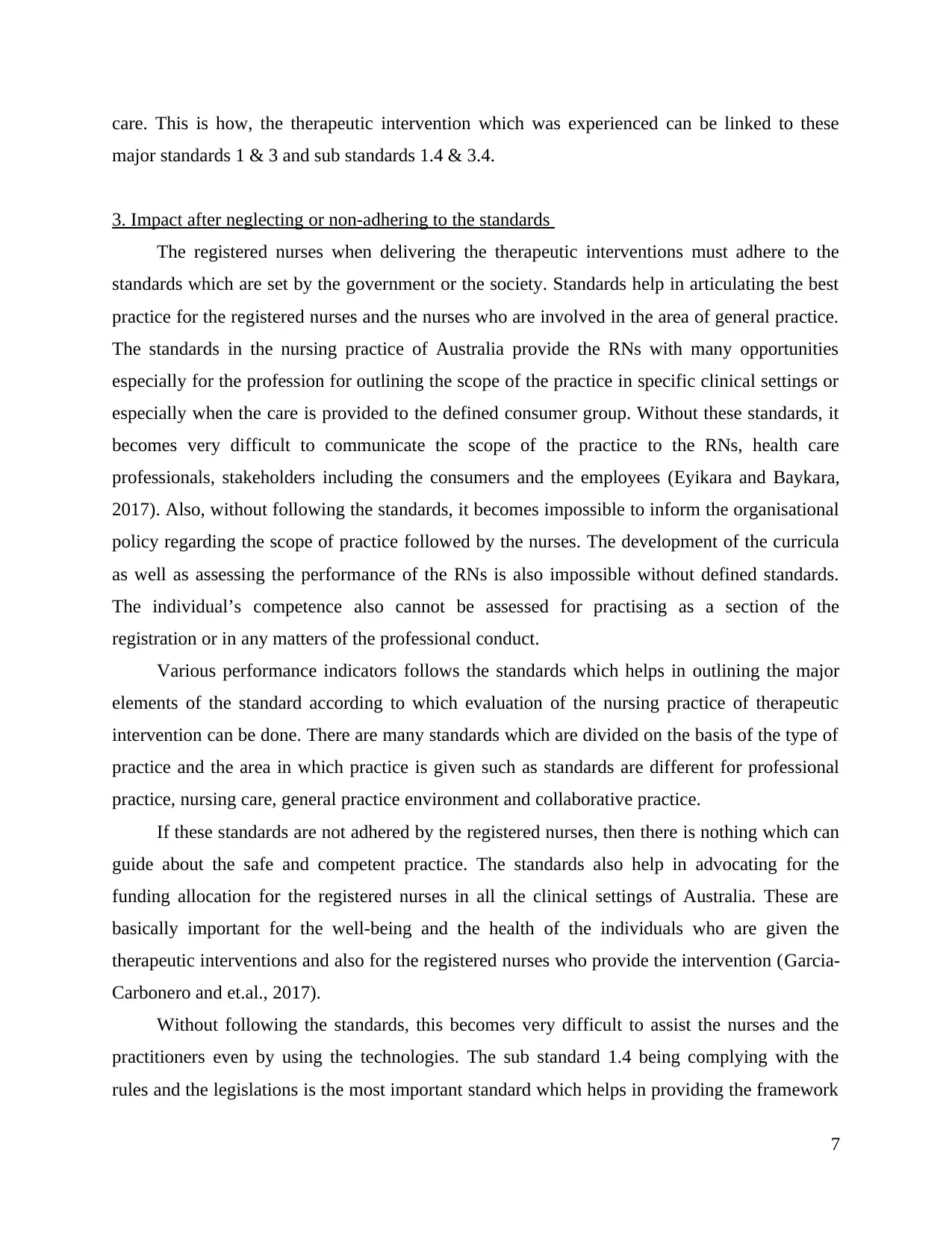
care. This is how, the therapeutic intervention which was experienced can be linked to these
major standards 1 & 3 and sub standards 1.4 & 3.4.
3. Impact after neglecting or non-adhering to the standards
The registered nurses when delivering the therapeutic interventions must adhere to the
standards which are set by the government or the society. Standards help in articulating the best
practice for the registered nurses and the nurses who are involved in the area of general practice.
The standards in the nursing practice of Australia provide the RNs with many opportunities
especially for the profession for outlining the scope of the practice in specific clinical settings or
especially when the care is provided to the defined consumer group. Without these standards, it
becomes very difficult to communicate the scope of the practice to the RNs, health care
professionals, stakeholders including the consumers and the employees (Eyikara and Baykara,
2017). Also, without following the standards, it becomes impossible to inform the organisational
policy regarding the scope of practice followed by the nurses. The development of the curricula
as well as assessing the performance of the RNs is also impossible without defined standards.
The individual’s competence also cannot be assessed for practising as a section of the
registration or in any matters of the professional conduct.
Various performance indicators follows the standards which helps in outlining the major
elements of the standard according to which evaluation of the nursing practice of therapeutic
intervention can be done. There are many standards which are divided on the basis of the type of
practice and the area in which practice is given such as standards are different for professional
practice, nursing care, general practice environment and collaborative practice.
If these standards are not adhered by the registered nurses, then there is nothing which can
guide about the safe and competent practice. The standards also help in advocating for the
funding allocation for the registered nurses in all the clinical settings of Australia. These are
basically important for the well-being and the health of the individuals who are given the
therapeutic interventions and also for the registered nurses who provide the intervention (Garcia-
Carbonero and et.al., 2017).
Without following the standards, this becomes very difficult to assist the nurses and the
practitioners even by using the technologies. The sub standard 1.4 being complying with the
rules and the legislations is the most important standard which helps in providing the framework
7
major standards 1 & 3 and sub standards 1.4 & 3.4.
3. Impact after neglecting or non-adhering to the standards
The registered nurses when delivering the therapeutic interventions must adhere to the
standards which are set by the government or the society. Standards help in articulating the best
practice for the registered nurses and the nurses who are involved in the area of general practice.
The standards in the nursing practice of Australia provide the RNs with many opportunities
especially for the profession for outlining the scope of the practice in specific clinical settings or
especially when the care is provided to the defined consumer group. Without these standards, it
becomes very difficult to communicate the scope of the practice to the RNs, health care
professionals, stakeholders including the consumers and the employees (Eyikara and Baykara,
2017). Also, without following the standards, it becomes impossible to inform the organisational
policy regarding the scope of practice followed by the nurses. The development of the curricula
as well as assessing the performance of the RNs is also impossible without defined standards.
The individual’s competence also cannot be assessed for practising as a section of the
registration or in any matters of the professional conduct.
Various performance indicators follows the standards which helps in outlining the major
elements of the standard according to which evaluation of the nursing practice of therapeutic
intervention can be done. There are many standards which are divided on the basis of the type of
practice and the area in which practice is given such as standards are different for professional
practice, nursing care, general practice environment and collaborative practice.
If these standards are not adhered by the registered nurses, then there is nothing which can
guide about the safe and competent practice. The standards also help in advocating for the
funding allocation for the registered nurses in all the clinical settings of Australia. These are
basically important for the well-being and the health of the individuals who are given the
therapeutic interventions and also for the registered nurses who provide the intervention (Garcia-
Carbonero and et.al., 2017).
Without following the standards, this becomes very difficult to assist the nurses and the
practitioners even by using the technologies. The sub standard 1.4 being complying with the
rules and the legislations is the most important standard which helps in providing the framework
7
Paraphrase This Document
Need a fresh take? Get an instant paraphrase of this document with our AI Paraphraser
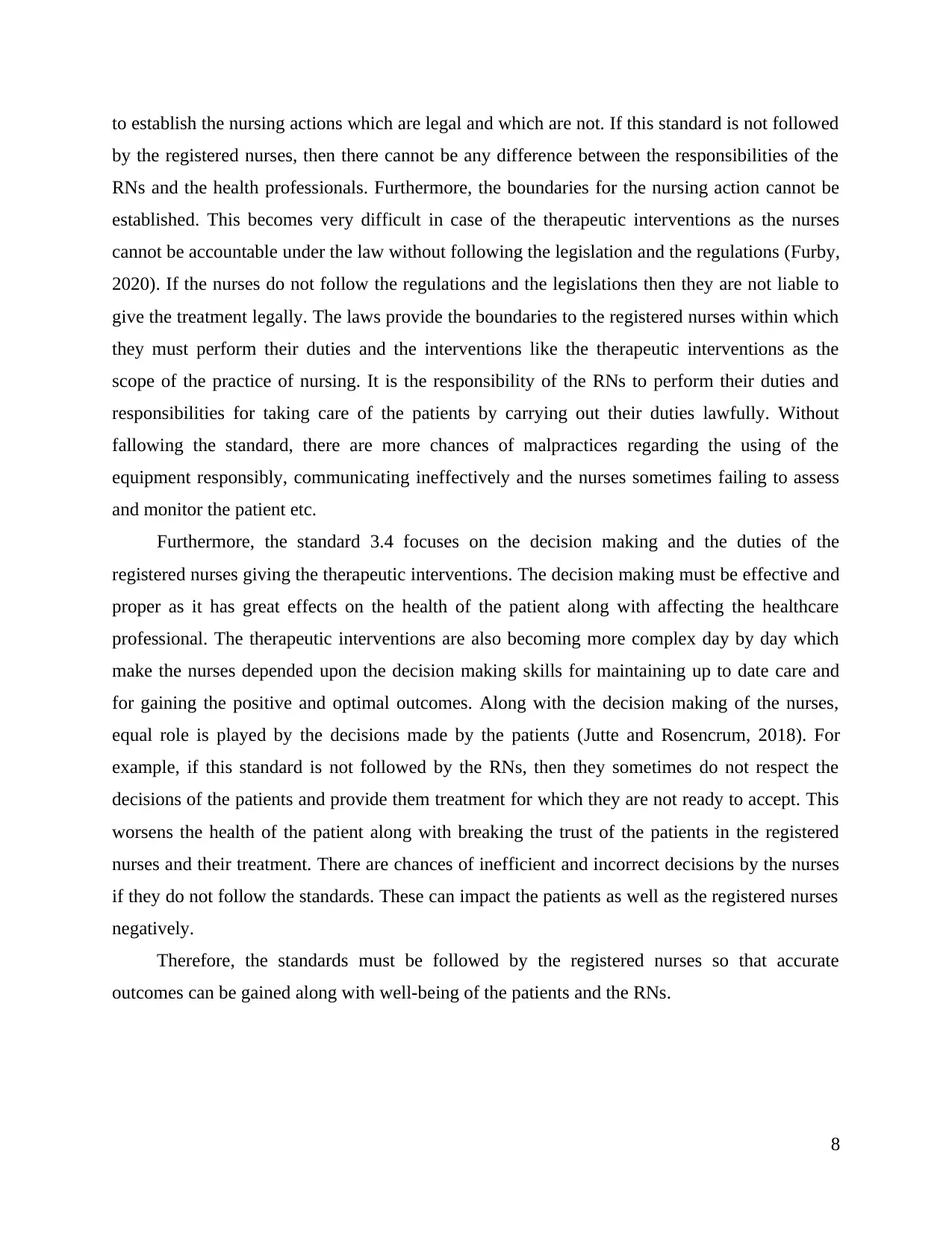
to establish the nursing actions which are legal and which are not. If this standard is not followed
by the registered nurses, then there cannot be any difference between the responsibilities of the
RNs and the health professionals. Furthermore, the boundaries for the nursing action cannot be
established. This becomes very difficult in case of the therapeutic interventions as the nurses
cannot be accountable under the law without following the legislation and the regulations (Furby,
2020). If the nurses do not follow the regulations and the legislations then they are not liable to
give the treatment legally. The laws provide the boundaries to the registered nurses within which
they must perform their duties and the interventions like the therapeutic interventions as the
scope of the practice of nursing. It is the responsibility of the RNs to perform their duties and
responsibilities for taking care of the patients by carrying out their duties lawfully. Without
fallowing the standard, there are more chances of malpractices regarding the using of the
equipment responsibly, communicating ineffectively and the nurses sometimes failing to assess
and monitor the patient etc.
Furthermore, the standard 3.4 focuses on the decision making and the duties of the
registered nurses giving the therapeutic interventions. The decision making must be effective and
proper as it has great effects on the health of the patient along with affecting the healthcare
professional. The therapeutic interventions are also becoming more complex day by day which
make the nurses depended upon the decision making skills for maintaining up to date care and
for gaining the positive and optimal outcomes. Along with the decision making of the nurses,
equal role is played by the decisions made by the patients (Jutte and Rosencrum, 2018). For
example, if this standard is not followed by the RNs, then they sometimes do not respect the
decisions of the patients and provide them treatment for which they are not ready to accept. This
worsens the health of the patient along with breaking the trust of the patients in the registered
nurses and their treatment. There are chances of inefficient and incorrect decisions by the nurses
if they do not follow the standards. These can impact the patients as well as the registered nurses
negatively.
Therefore, the standards must be followed by the registered nurses so that accurate
outcomes can be gained along with well-being of the patients and the RNs.
8
by the registered nurses, then there cannot be any difference between the responsibilities of the
RNs and the health professionals. Furthermore, the boundaries for the nursing action cannot be
established. This becomes very difficult in case of the therapeutic interventions as the nurses
cannot be accountable under the law without following the legislation and the regulations (Furby,
2020). If the nurses do not follow the regulations and the legislations then they are not liable to
give the treatment legally. The laws provide the boundaries to the registered nurses within which
they must perform their duties and the interventions like the therapeutic interventions as the
scope of the practice of nursing. It is the responsibility of the RNs to perform their duties and
responsibilities for taking care of the patients by carrying out their duties lawfully. Without
fallowing the standard, there are more chances of malpractices regarding the using of the
equipment responsibly, communicating ineffectively and the nurses sometimes failing to assess
and monitor the patient etc.
Furthermore, the standard 3.4 focuses on the decision making and the duties of the
registered nurses giving the therapeutic interventions. The decision making must be effective and
proper as it has great effects on the health of the patient along with affecting the healthcare
professional. The therapeutic interventions are also becoming more complex day by day which
make the nurses depended upon the decision making skills for maintaining up to date care and
for gaining the positive and optimal outcomes. Along with the decision making of the nurses,
equal role is played by the decisions made by the patients (Jutte and Rosencrum, 2018). For
example, if this standard is not followed by the RNs, then they sometimes do not respect the
decisions of the patients and provide them treatment for which they are not ready to accept. This
worsens the health of the patient along with breaking the trust of the patients in the registered
nurses and their treatment. There are chances of inefficient and incorrect decisions by the nurses
if they do not follow the standards. These can impact the patients as well as the registered nurses
negatively.
Therefore, the standards must be followed by the registered nurses so that accurate
outcomes can be gained along with well-being of the patients and the RNs.
8
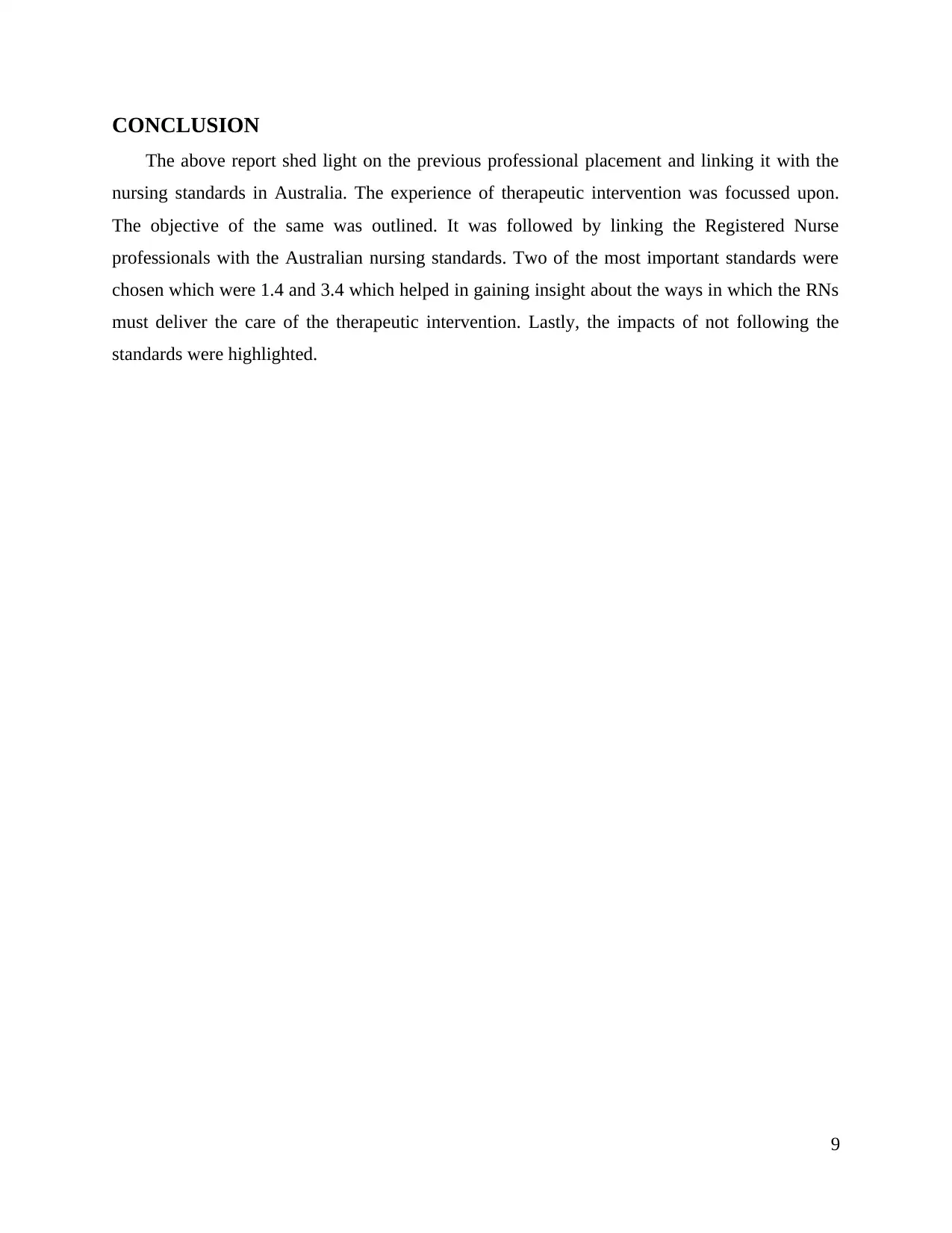
CONCLUSION
The above report shed light on the previous professional placement and linking it with the
nursing standards in Australia. The experience of therapeutic intervention was focussed upon.
The objective of the same was outlined. It was followed by linking the Registered Nurse
professionals with the Australian nursing standards. Two of the most important standards were
chosen which were 1.4 and 3.4 which helped in gaining insight about the ways in which the RNs
must deliver the care of the therapeutic intervention. Lastly, the impacts of not following the
standards were highlighted.
9
The above report shed light on the previous professional placement and linking it with the
nursing standards in Australia. The experience of therapeutic intervention was focussed upon.
The objective of the same was outlined. It was followed by linking the Registered Nurse
professionals with the Australian nursing standards. Two of the most important standards were
chosen which were 1.4 and 3.4 which helped in gaining insight about the ways in which the RNs
must deliver the care of the therapeutic intervention. Lastly, the impacts of not following the
standards were highlighted.
9
⊘ This is a preview!⊘
Do you want full access?
Subscribe today to unlock all pages.

Trusted by 1+ million students worldwide
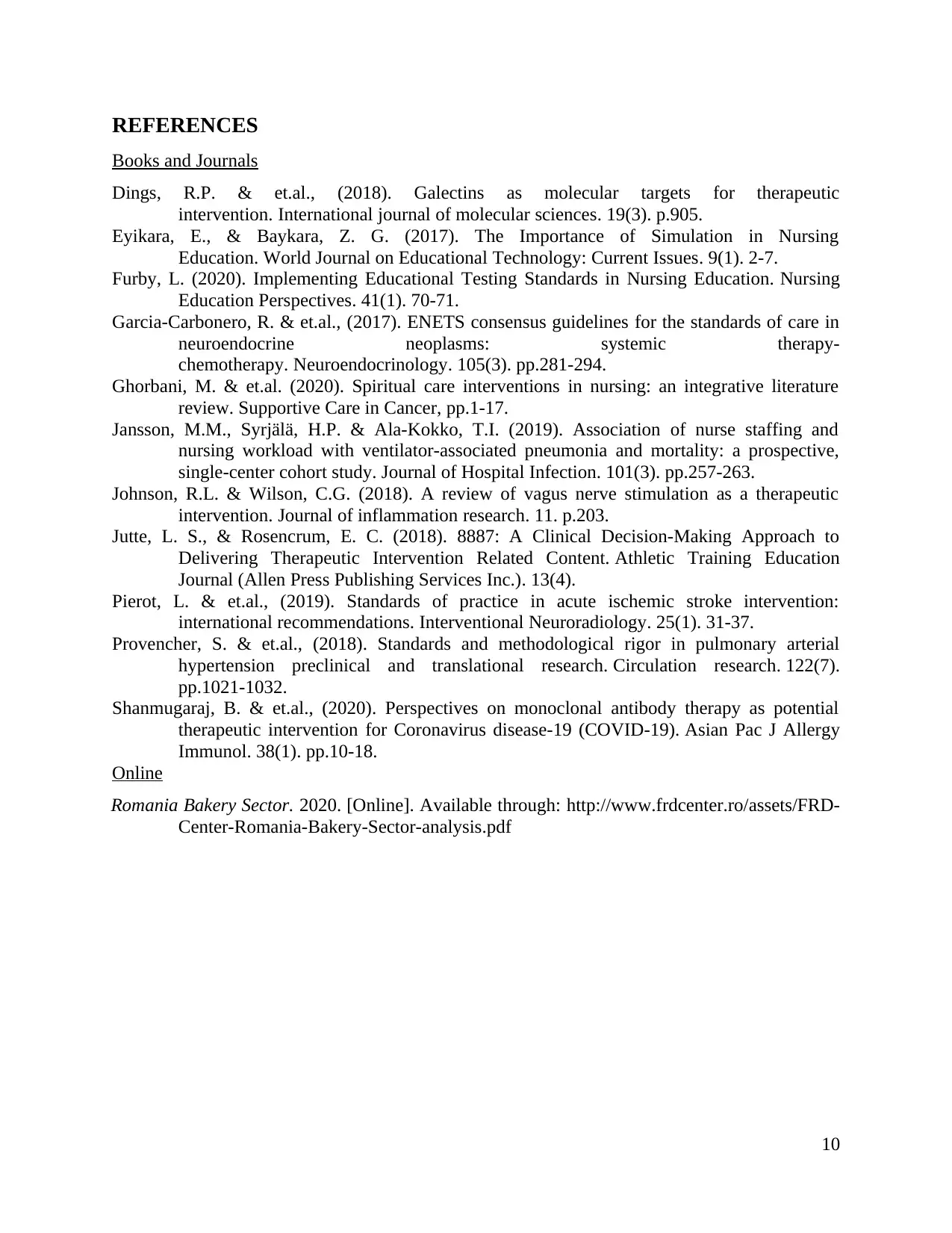
REFERENCES
Books and Journals
Dings, R.P. & et.al., (2018). Galectins as molecular targets for therapeutic
intervention. International journal of molecular sciences. 19(3). p.905.
Eyikara, E., & Baykara, Z. G. (2017). The Importance of Simulation in Nursing
Education. World Journal on Educational Technology: Current Issues. 9(1). 2-7.
Furby, L. (2020). Implementing Educational Testing Standards in Nursing Education. Nursing
Education Perspectives. 41(1). 70-71.
Garcia-Carbonero, R. & et.al., (2017). ENETS consensus guidelines for the standards of care in
neuroendocrine neoplasms: systemic therapy-
chemotherapy. Neuroendocrinology. 105(3). pp.281-294.
Ghorbani, M. & et.al. (2020). Spiritual care interventions in nursing: an integrative literature
review. Supportive Care in Cancer, pp.1-17.
Jansson, M.M., Syrjälä, H.P. & Ala-Kokko, T.I. (2019). Association of nurse staffing and
nursing workload with ventilator-associated pneumonia and mortality: a prospective,
single-center cohort study. Journal of Hospital Infection. 101(3). pp.257-263.
Johnson, R.L. & Wilson, C.G. (2018). A review of vagus nerve stimulation as a therapeutic
intervention. Journal of inflammation research. 11. p.203.
Jutte, L. S., & Rosencrum, E. C. (2018). 8887: A Clinical Decision-Making Approach to
Delivering Therapeutic Intervention Related Content. Athletic Training Education
Journal (Allen Press Publishing Services Inc.). 13(4).
Pierot, L. & et.al., (2019). Standards of practice in acute ischemic stroke intervention:
international recommendations. Interventional Neuroradiology. 25(1). 31-37.
Provencher, S. & et.al., (2018). Standards and methodological rigor in pulmonary arterial
hypertension preclinical and translational research. Circulation research. 122(7).
pp.1021-1032.
Shanmugaraj, B. & et.al., (2020). Perspectives on monoclonal antibody therapy as potential
therapeutic intervention for Coronavirus disease-19 (COVID-19). Asian Pac J Allergy
Immunol. 38(1). pp.10-18.
Online
Romania Bakery Sector. 2020. [Online]. Available through: http://www.frdcenter.ro/assets/FRD-
Center-Romania-Bakery-Sector-analysis.pdf
10
Books and Journals
Dings, R.P. & et.al., (2018). Galectins as molecular targets for therapeutic
intervention. International journal of molecular sciences. 19(3). p.905.
Eyikara, E., & Baykara, Z. G. (2017). The Importance of Simulation in Nursing
Education. World Journal on Educational Technology: Current Issues. 9(1). 2-7.
Furby, L. (2020). Implementing Educational Testing Standards in Nursing Education. Nursing
Education Perspectives. 41(1). 70-71.
Garcia-Carbonero, R. & et.al., (2017). ENETS consensus guidelines for the standards of care in
neuroendocrine neoplasms: systemic therapy-
chemotherapy. Neuroendocrinology. 105(3). pp.281-294.
Ghorbani, M. & et.al. (2020). Spiritual care interventions in nursing: an integrative literature
review. Supportive Care in Cancer, pp.1-17.
Jansson, M.M., Syrjälä, H.P. & Ala-Kokko, T.I. (2019). Association of nurse staffing and
nursing workload with ventilator-associated pneumonia and mortality: a prospective,
single-center cohort study. Journal of Hospital Infection. 101(3). pp.257-263.
Johnson, R.L. & Wilson, C.G. (2018). A review of vagus nerve stimulation as a therapeutic
intervention. Journal of inflammation research. 11. p.203.
Jutte, L. S., & Rosencrum, E. C. (2018). 8887: A Clinical Decision-Making Approach to
Delivering Therapeutic Intervention Related Content. Athletic Training Education
Journal (Allen Press Publishing Services Inc.). 13(4).
Pierot, L. & et.al., (2019). Standards of practice in acute ischemic stroke intervention:
international recommendations. Interventional Neuroradiology. 25(1). 31-37.
Provencher, S. & et.al., (2018). Standards and methodological rigor in pulmonary arterial
hypertension preclinical and translational research. Circulation research. 122(7).
pp.1021-1032.
Shanmugaraj, B. & et.al., (2020). Perspectives on monoclonal antibody therapy as potential
therapeutic intervention for Coronavirus disease-19 (COVID-19). Asian Pac J Allergy
Immunol. 38(1). pp.10-18.
Online
Romania Bakery Sector. 2020. [Online]. Available through: http://www.frdcenter.ro/assets/FRD-
Center-Romania-Bakery-Sector-analysis.pdf
10
1 out of 10
Related Documents
Your All-in-One AI-Powered Toolkit for Academic Success.
+13062052269
info@desklib.com
Available 24*7 on WhatsApp / Email
![[object Object]](/_next/static/media/star-bottom.7253800d.svg)
Unlock your academic potential
Copyright © 2020–2026 A2Z Services. All Rights Reserved. Developed and managed by ZUCOL.





